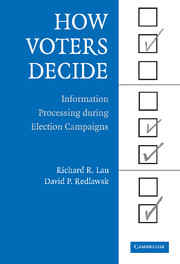Book contents
- Frontmatter
- Contents
- List of Tables and Figures
- Acknowledgments
- HOW VOTERS DECIDE
- I Theory and Methods
- II Information Processing
- III Politics
- 8 Evaluating Candidates
- 9 Voting
- 10 Voting Correctly
- 11 Political Heuristics
- IV Conclusion
- Appendix A Detailed Examples of Decision Strategies in Action
- Appendix B How the Dynamic Information Board Works
- Appendix C Overview of Experimental Procedures
- Appendix D Detailed Decision Scripts
- Appendix E Calculating the On-line Evaluation Counter
- References
- Index
- Titles in the series
11 - Political Heuristics
Published online by Cambridge University Press: 05 September 2012
- Frontmatter
- Contents
- List of Tables and Figures
- Acknowledgments
- HOW VOTERS DECIDE
- I Theory and Methods
- II Information Processing
- III Politics
- 8 Evaluating Candidates
- 9 Voting
- 10 Voting Correctly
- 11 Political Heuristics
- IV Conclusion
- Appendix A Detailed Examples of Decision Strategies in Action
- Appendix B How the Dynamic Information Board Works
- Appendix C Overview of Experimental Procedures
- Appendix D Detailed Decision Scripts
- Appendix E Calculating the On-line Evaluation Counter
- References
- Index
- Titles in the series
Summary
We argued in Chapter 2 that one of the ways that decision makers overcome their cognitive limits is by employing cognitive shortcuts or heuristics that reduce processing demands. It has become conventional wisdom in political science to assume (1) that pretty much all voters employ such heuristics, and (2) that they help voters make reasonable judgments and decisions despite their lack of detailed knowledge about political candidates and issues. These are the two fundamental – but largely untested – assumptions about political heuristics. They are so widely assumed now that we think it is safe to refer to them as a new conventional wisdom in political science. In some real sense, “low information rationality” (Popkin, 1991) has become a catch-all term, a verbal solution to tricky analytic problems that is consistent with certain stylized facts about the electorate, a verbal solution that allows researchers to move on to other problems they find more tractable (see also Sniderman, 1993). The terms “cognitive shortcuts” or “heuristics” or “low information rationality” have become so pervasive in the field that it now seems they can mean almost anything – which is getting dangerously close to meaning nothing. As Bartels (1996) warns, however, it is far easier to assume that information shortcuts allow uninformed voters to act as if they were fully informed, than to demonstrate that in fact they do.
- Type
- Chapter
- Information
- How Voters DecideInformation Processing in Election Campaigns, pp. 229 - 252Publisher: Cambridge University PressPrint publication year: 2006



